Trustee, faculty members will serve as fellows of academy
By John Easton, William Harms, Steve Koppes, and Josh SchonwaldNews Office and Medical Center Communications
The American Academy of Arts and Sciences announced on Monday, April 30, its election of 203 new fellows and 24 new foreign honorary members. Ten Chicago scholars and one University trustee are among them, making Chicago one the best represented institutions in the academy for 2007.
Among the 70 universities represented in the 2007 class, Chicago’s 11 fellows was third to Harvard University's 14 fellows and the Massachusetts Institute of Technology’s 12. Following Chicago were Stanford University (eight), Yale University (eight), the University of California (Berkeley, seven; Los Angeles, six; San Francisco, six), and Princeton University (five).
Among this year’s class of fellows from Chicago are: Jerry Coyne, Professor in Ecology & Evolution and the College; Karl Freed, the Henry J. Gale Distinguished Service Professor in Chemistry and the College; Susan Gal, the Mae and Sidney G. Metzl Distinguished Service Professor in Anthropology and Linguistics and the College; John Goldsmith, the Edward Carson Waller Distinguished Service Professor in Linguistics and Computer Science; Janellen Huttenlocher, the William S. Gray Professor in Psychology and the College; Robert Pippin, the Evelyn Stefansson Nef Distinguished Service in Social Thought and the College; George Ranney Jr., University Trustee and President and CEO of Chicago Metropolis 2020; Donald Stewart, Visiting Professor in the Irving B. Harris Graduate School of Public Policy Studies; Bruce Winstein, the Samuel K. Allison Distinguished Service Professor in Physics and the College; Wu Hung, the Harrie H. Vanderstappen Distinguished Service Professor in Art History and the College and Director of the Center for the Art of East Asia; and Robert Zimmer, President and Professor in Mathematics and the Physical Sciences Collegiate Division.
The 227 scholars, scientists, artists, and civic, corporate and philanthropic leaders come from 27 states and 13 countries. They represent 70 universities, including seven presidents or chancellors; more than a dozen corporations; as well as museums, research institutes, media outlets and foundations.
This year’s new fellows also include former Vice President Albert Gore, Jr.; former Supreme Court Associate Justice Sandra Day O’Connor; New York Mayor and businessman Michael Bloomberg; and Google Chairman and CEO Eric Schmidt.
Fellows and foreign honorary members are nominated and elected to the academy by current members. A broad-based membership, which comprises scholars and practitioners from mathematics, physics, biological sciences, social sciences, humanities and the arts, public affairs and business, gives the academy a unique capacity to conduct a wide range of interdisciplinary studies and public policy research.
“It gives me great pleasure to welcome these outstanding leaders in their fields to the academy,” said Emilio Bizzi, president of the academy. “Fellows are selected through a highly competitive process that recognizes individuals who have made preeminent contributions to their disciplines and to society at large.”
Academy CEO Leslie Berlowitz added, “Throughout its history, the academy has convened the leading thinkers of the day, from diverse perspectives, to participate in projects and studies that advance the public good. I am confident that this distinguished class of new fellows will continue that tradition of cherishing knowledge and shaping the future.”
The academy will welcome this year’s new class at its annual Induction Ceremony Saturday, Oct. 6, at its headquarters in Cambridge, Mass.
Founded in 1780 by John Adams, James Bowdoin, John Hancock and other scholar-patriots, the American Academy of Arts and Sciences has elected as its members the finest minds and most influential leaders from each generation. The current membership includes more than 170 Nobel laureates and 50 Pulitzer Prize winners. As an independent policy research center, the academy’s current research focuses on science and global security; social policy; the humanities and culture; and education.
Jerry Coyne studies diverse areas of evolutionary genetics. An outspoken defender of evolution against proponents of intelligent design, whose research has been featured in Nature, Science and Evolution, Coyne has been a Chicago faculty member since 1986 and became Professor in 1991.
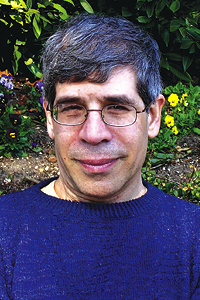 Jerry Coyne 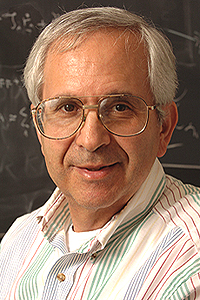 Karl Freed 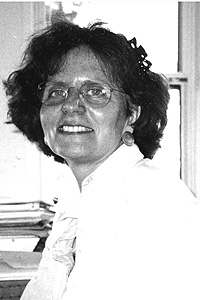 Susan Gal | |
Before coming to the University, Coyne held a National Institutes of Health postdoctoral fellowship at the University of California, Davis, and then taught at the University of Maryland. His research interests include population and evolutionary genetics, speciation, ecological and quantitative genetics, chromosome evolution and sperm competition. Using the fruit fly Drosophila, Coyne’s lab at Chicago seeks to understand the origin of species, in particular the genetic underpinnings of this process and evolutionary forces that drive the origin of the species.
Coyne’s articles have appeared not only in scientific journals but also in popular magazines and newspapers such as The New Republic, the Chicago Tribune, The Guardian, The Times Literary Supplement, The New York Times and The Economist. At the University, he also serves on the Committee on Genetics and the Committee on Evolutionary Biology.
He has degrees in biology from the College of William and Mary, where he earned a B.A., and Harvard University, where he earned a Ph.D.
Karl Freed’s research specialties include the study of polymer physics and theoretical and biophysical chemistry. The scope of his work includes the statistical mechanics of polymers in the liquid phase, protein dynamics aggregation and folding, equilibrium aggregation phenomena, and molecular electronic structure.
He and his team have developed a theory for the statistical thermodynamics of polymers in the liquid form. It is the first and only theory to describe the influence of monomer molecular structure on the thermodynamic properties of polymer mixtures.
Freed has held visiting positions at a variety of institutions, including the University of Manchester, England, as a NATO postdoctoral fellow, the Cavendish Laboratory in Cambridge, England, and as a senior visiting fellow at IBM Research Labs in Almaden, Calif., where he served as a visiting scientist.
Among his honors, he has been a fellow of the Alfred P. Sloan Foundation, the John Simon Guggenheim Memorial Foundation and the American Physical Society. He is a member of the Tau Beta Pi engineering honorary and the Phi Lambda Upsilon chemistry honorary.
Freed also has received the Marlow Medal from the Chemical Society of London, the American Chemical Society Award in Pure Chemistry and the Case Centennial Scholar Medal of Case Western Reserve University.
Susan Gal studies the political economy of language, including linguistic nationalism, language and gender, and the rhetorical and symbolic aspects of political transformation with a focus on contemporary Eastern Europe and post-socialist societies in general.
Her book The Politics of Gender After Socialism, written with G. Kligman, won the Heldt Prize of the American Association for the Advancement of Slavic Studies in 2000. It offers a new approach to the East European transitions. Gal’s 1979 book Language Shift: Social Determinants of Linguistic Change in Bilingual Austria is an influential work of sociolinguistic theory. She also has co-edited two volumes on language and authority and on reproduction.
In 2002, Gal received a John Simon Guggenheim Memorial Foundation fellowship, and as a result she began new research that challenged many of the widely held views about political language that other scholars had developed in the wake of the fall of communism in Eastern Europe. Some scholars have argued that the unreliable language used in official newspapers caused the corruption of public and private life and the fall of communism, a position Gal disputes.
She argues for the importance of seeing the Cold War as a communicative system by analyzing official American and Soviet language ideologies and practices within the same conceptual framework. Her current research explores the politics of translation and the effects of textual circulation on transnational exchange.
 John Goldsmith  Janellen Huttenlocher 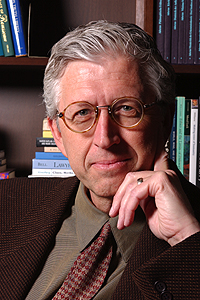 Robert Pippin | |
John Goldsmith has been a member of the Chicago faculty since 1984. His wide-ranging research interests often focus on the application of computer science to the study of linguistics. His work has focused on computational linguistics, phonological theory, Bantu languages, American Sign Language and French. He heads the Linguistica project at the University, an automatic morphology learner for natural languages.
The co-author of Ideology and Linguistic Theory, Goldsmith was honored by Discover magazine as a finalist in the 1997 Technology Awards for his computer application Speakeasy, which transforms the monotone computer voice into a human-sounding voice using linguistic rules. In 1995, he was a recipient of the University’s Faculty Award for Excellence in Graduate Teaching.
Janellen Huttenlocher conducts research on various aspects of cognitive development: quantitative development, the development of spatial understanding and the development of language. She also has studied people’s memories of events.
Her research on vocabulary shows that the size and growth of vocabulary in early childhood is highly related to the amount of speech children hear, and that the mastery of complex syntax forms is highly correlated to the proportion of complex speech used by parents.
Her work on quantitative development, which showed early development of number skills, includes collaborations with Susan Levine, Professor in Psychology and the College. Their findings have been reported in a book Quantitative Development in Infancy and Early Childhood, published in 2002.
Her work on spatial development, in collaboration with Nora Newcombe at Temple University, showed early development of spatial skills, and their finding led to the 2000 book, Making Space: The Development of Spatial Representation and Reasoning.
Huttenlocher also does research on conceptual representation and memory. In this work she has collaborated with Larry Hedges, board of trustees professor of statistics and social policy at Northwestern University.
She received the 2002 G. Stanley Hall Award for Lifetime Achievement in Developmental Psychology from the American Psychological Association.
Robert Pippin studies the modern German philosophical tradition, contemporary continental philosophy in general, moral theory, social and political philosophy, theories of modernity and various topics in ancient philosophy.
He also has a number of interdisciplinary interests that involve philosophical issues in literature, art history and film.
In 2001, Pippin received a Distinguished Achievement Award from the Andrew W. Mellon Foundation. In awarding the prize, the Mellon Foundation described Pippin’s Henry James and Modern Moral Life as “a model of productive engagement between philosophy and literary studies” that also exemplifies “the intellectual breadth of the University of Chicago’s famed Committee on Social Thought.”
Pippin’s work also has focused on trying to understand the modern condition by re-examining German philosophy in books such as Kant’s Theory of Form, Hegel’s Idealism and Idealism as Modernism: Hegelian Variations.
Pippin also has studied Hegel’s theory of freedom, which led to the book, Hegel on Ethics and Politics, which he co-edited.
He has studied how Nietzsche’s misgivings about modern secular democratic society relate to the nature of human desire, particularly philosophical desire. His studies on Nietzsche led to Nietzsche, moraliste français: La conception nietzschéenne d’une psychologie philosophique.
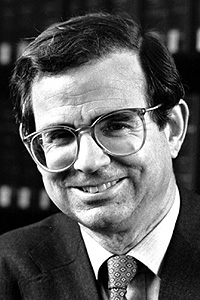 George Ranney Jr. 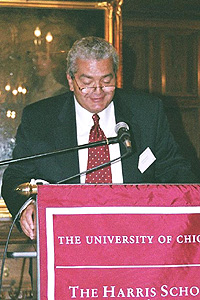 Donald Stewart 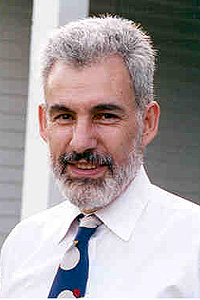 Bruce Winstein | |
George Ranney Jr. volunteers 50 percent of his time as President and CEO of Chicago Metropolis 2020, a business-based organization formed by the Commercial Club of Chicago. Established to improve the region’s economic competitiveness, Chicago Metropolis 2020 is implementing long-term policies for regional growth, emphasizing transportation, housing, early childhood education and criminal justice.
Ranney is senior counsel at Mayer, Brown, Rowe & Maw, a law firm headquartered in Chicago that conducts business globally. He also is chairman and CEO of Prairie Holdings Corporation, the developer of Prairie Crossing, a nationally known real estate development designed on conservation principles and located in Grayslake, Ill.
He spent 18 years with Inland Steel Industries, where he served as vice president for raw materials and energy, and president of the Inland Steel Mining Company. He also was vice president and General Counsel for Inland and its successor company, Ryerson Tull.
Ranney is a 2004 recipient of the Order of Lincoln, the highest honor given by the State of Illinois. His service to Illinois began in 1969 as deputy budget director under former Illinois Gov. Richard Ogilvie. Since that time, Ranney also has served on several other task forces, under former Governors James Edgar and James Thompson, including the task force that proposed the Regional Transportation Authority and led the successful six-county referendum campaign that approved it.
He also is a trustee for the Committee on Economic Development in Washington, D.C., and is on the Chicago committee of the Chicago Council on Foreign Relations.
A writer who has contributed to the Chicago Tribune, The Atlantic and the University of Chicago Law Review, where he was editor-in-chief while attending the Law School, Ranney also has taught law and public policy at Chicago. He earned his A.B. from Harvard College in 1962, and his J.D. from Chicago in 1966.
Donald Stewart has been a Visiting Professor in the Irving B. Harris Graduate School of Public Policy Studies School since 2005. Stewart is currently teaching the course, “The Future of Philanthropy in the United States: Who Knows?” and has taught the course “The Nonprofit Sector: Behavior and Viability of Civil Society Organizations.”
He previously served as CEO and President of the Chicago Community Trust, and he has served as a Senior Program Officer and Special Advisor to the President at the Carnegie Corporation.
Stewart also is the former President and CEO of the College Board and the former President of Spelman College. He spent several years at the University of Pennsylvania, serving in numerous leadership positions. He also had many overseas assignments as a member of the Overseas Development Division of the Ford Foundation.
Stewart earned a B.A. from Grinnell College, a M.A. from Yale University, and a M.A. in Public Administration and Ph.D. in Public Administration from the Kennedy School of Government at Harvard University.
Bruce Winstein currently studies the cosmic microwave background radiation, the afterglow from the big bang, for information about the physical conditions in the early universe. He was the founding director of the National Science Foundation Physics Frontier Center for Cosmological Physics, established in 2001 and known today as the Kavli Institute for Cosmological Physics. Winstein now heads the Q/U Imaging Experiment.
A multi-institutional collaboration, the Q/U Imaging Experiment is attempting to measure small variations in the cosmic microwave background polarization using novel detectors operating at a facility at high altitude in Chile. These variations contain information about the structure and composition of the early universe.
Before turning his attention to cosmology in recent years, Winstein specialized in particle physics. He led a research team that in 1999 announced making the definitive observation of a new type of CP violation. CP (charge-parity) violation is the phenomenon that led to the vast predominance of matter over antimatter in the universe. The only other observation of CP violation before that came in 1964, in an experiment that earned James Cronin, the University Professor Emeritus in Physics and the College, and Val Fitch the 1980 Nobel Prize in Physics.
Winstein’s honors include membership in the National Academy of Sciences, a Panofsky Prize and a John Simon Memorial Foundation Guggenheim fellowship.
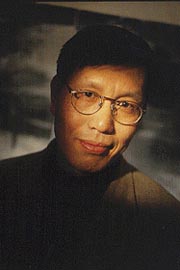 Wu Hung 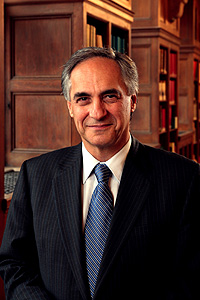 Robert Zimmer | |
Wu Hung specializes in early Chinese art, from the earliest years to the present.
His special research interests include relationships between visual expressions (architecture, objects, pictorial images and contemporary art forms) and ritual, social memory, political discourses and cultural interactions.
The consulting curator for the Smart Museum of Art, he has written and published more than 20 books, collections of essays and exhibition catalogues, including Transience: Chinese Experimental Art at the End of the Twentieth Century, Monumentality in Early Chinese Art and Architecture, and Remaking Beijing: Tiananmen Square and the Creation of a Political Space.
A native of Beijing, Wu studied at the Central Academy of Fine Arts in Beijing and at Harvard University. From 1973 to 1978 he served on the research staff at the Palace Museum, located inside Beijing’s Forbidden City. After teaching at Harvard University for seven years, he became a member of the University faculty in 1994.
President Zimmer is a specialist in geometry, particularly ergodic theory, Lie groups and differential geometry. He is the author of two books, Ergodic Theory and Semisimple Groups (1984) and Essential Results of Functional Analysis (1990), and more than 80 mathematical research articles. The recipient of an Alfred P. Sloan Foundation fellowship, he also served on the Board of Mathematical Sciences of the National Research Council from 1992 to 1995, and was on the executive committee from 1993 to 1995.
Zimmer has been a faculty member at the U.S. Naval Academy, the University of California, Berkeley, and Brown University as well as at Chicago. In addition to his teaching and research, Zimmer has served in many administrative capacities at Chicago and Brown University.
At Chicago Zimmer has completed terms as Chairman of the Mathematics Department, Deputy Provost, and Vice President for Research and for Argonne National Laboratory. Formerly the Provost of Brown University, he was named President of the University of Chicago last year.
His current responsibilities include serving as Chairman of the Board of Directors of UChicagoArgonne LLC, which manages Argonne National Laboratory for the U.S. Department of Energy, and as Chairman of Fermi Research Alliance LLC, which manages Fermi National Accelerator Laboratory for the DOE.
![[Chronicle]](/images/sidebar_header_oct06.gif)